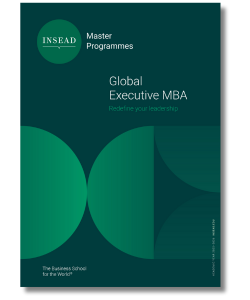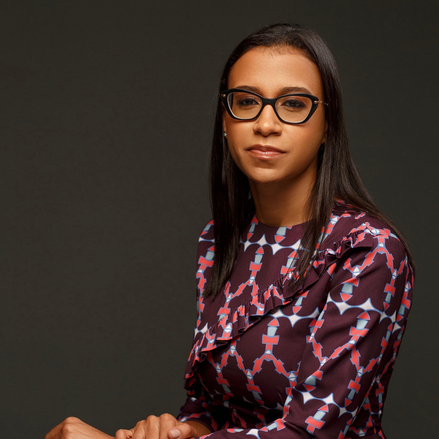Gender imbalance and the experiences of women and men in business and society have consequences for both organisations and the communities they serve.
Across the African continent specifically, progress has been made in recent years to overcome discriminations, but efforts remain to be made. We spoke to two INSEAD Global Executive MBA alumnae who are playing a key role to advance conversations around gender parity and diversity in the region.
Does the gender conversation differ across the African continent?
Edwige Senou-Koné
Executive Director Finance Procurement and Administration at Millennium Challenge Account Côte d'Ivoire
Ivorian, French
INSEAD GEMBA'18
Across Africa women encounter common injustices.
Gender inequality also differs according to varied political, economic and cultural factors.
However, we are unanimous on the conversations around the empowerment of women and girls, specifically to access and control over resources, opportunities and productive assets as well as access to education and health."
Alice Tomdio
CFO at Yellow Card Financial
Cameroonian
INSEAD GEMBA'21
The conversation around gender equality has largely been around women's workforce participation.
But you'd be surprised that in still quite a few countries in Africa, women don't even have legal rights, or access to reliable healthcare.
Parity in society is just as, if not more, important than parity at work.
Are there any unique challenges or issues as compared to other regions around the world?
Alice: A lot of women in Africa are still informally employed, particularly in agriculture. According to the World Bank, informal employment generates 38% of GDP in Sub-Saharan Africa, compared with 17% in the rest of the world.
And even within the informal sector, women have access to less resources to truly scale and grow.
We will not be able to derive the full potential of women as long we don't support their growth and development, be it through funding, education and other important initiatives.
And what you see in agriculture cascades to other industries, including mine - tech start-ups.
According to FirstCheck, a venture fund exclusively funding female founders, $5 billion of capital funded startups in Africa last year. Just 1% went to companies without a male founder and most of that to women who are either not African or not based on the continent.
In the last 10 years, the share has averaged about 3%. It’s also true that all-female (around 10%) and mixed-gender (around 20%) co-founding teams consistently attract lower amounts of capital than their all-male peers.
Edwige: As disparities against women in Africa, we can cite among others:
- African women are under-represented in most African countries in decision-making bodies and in elected assemblies
- In the education system, inequalities between men and women are flagrant. Girls continue to attend school less than boys and this gap widens as the school career progresses
- 1 in 3 women are victims of gender-based violence in Africa
- Almost 4 out of 10 girls are married before the age of 18 in Africa
- African women devote more hours per day than men to household chores (about 3-4 hours longer than men)
- At work, women earn, on average, only half the salary of men
- Women in informal jobs are more often in the most disadvantaged professional categories, for example, domestic workers, homeworkers, assistants in small family businesses, which are among the most vulnerable informal jobs and the lowest paid
What initiatives have you or your organisation put in place in face of these concerns?
Alice: An important critical step to creating gender parity at work is to hire and promote women.
According to a recent study by Triple-A, only 21% of global crypto ownership is female, while 79% is male-owned. We’ve launched programmes targeting women specifically, like our most recent Women in Crypto webinar in August. We bring together female crypto users and women working in crypto to help educate and share their personal experiences.
There's no better way to bring more women into the fold when you see other women in it already.
Edwige: The issue of gender and social inclusion is a very important pillar of Millennium Challenge Corporation's programmes.
As part of the Compact Programme, MCA Côte d'Ivoire has put in place the Gender and Social Inclusion Action Plan (PAGIS) which operationalises the commitment of MCA-Côte d'Ivoire and the various Compact stakeholders for the promotion of gender and social inclusion (GIS) in all stages of the design and implementation of Compact projects.
Many achievements and actions put in place so far, for instance:
- Creation of the Department of Gender Equality and Equity within the Ministry of National Education and Literacy
- Implementation of the gender policy within the Ministry of National Education and Literacy
- Training of MCA staff, implementing entities and service providers on gender and social inclusion issues
- Operationalisation of the gender policy through priority actions in two regions of the skills project
- Determination of an objective to achieve for the representation of women within the Master in Engineering, Economics, Environmental and Social (3ES) intended for government entities involved in the Compact programme
- Participation of hundreds of young Ivorian girls in the Women in Science (WiSci) camp promoted by the Girl Up initiative of the United Nations Foundation
How can others support the gender parity movement in the region? What can people do on an organisational or individual level?
Edwige: Making progress on the gender issue in Africa and reducing inequalities require awareness-raising, training, support for empowerment, more representation of women and girls at all political, economic and social levels of the society. Quota setting in certain areas if appropriate.
The basis of these initiatives remains the integration of these gender aspects in education, the sensitisation of leaders and government to set an example through concrete actions to reduce inequalities and support for women and girls in this new dynamic (such as mentoring, financing, training etc.).
Alice: We can all start to fund female founders, hire women into leadership positions, vote for women running for public office and be deliberate about reaching female customers (no matter your business). The change is catalytic when we all are deliberate about playing a role.








